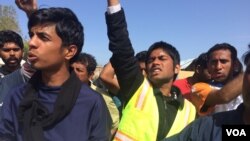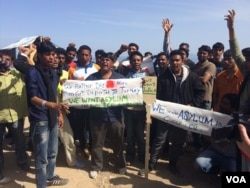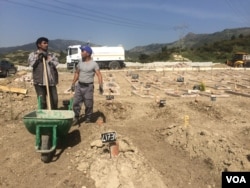Modar, a Syrian refugee, arrived in Europe last fall wearing a secondhand shirt he purchased in Damascus for $1. The shirt was clean, unwrinkled and stylish.
"When we get to Europe, we want them to think we are good," he had told me in Izmir, Turkey, the day before his rubber-boat journey to Greece. In his mind, Europeans didn't want a bunch of bums showing up.
As it turned out, he was at least partly wrong.
The idea that refugees had nice clothes and smartphones clearly irked some people, Modar later learned, evidenced by outrage expressed online that persists today.
The outraged people, however, often present what they believe to be facts but are — like Modar's belief that Europe wanted well-dressed refugees — thoughts originating with social media myths.
Myth 2: The majority of refugees coming to Europe are young men
Statistically, this was true in 2015, when 58 percent of the more than one million people who traveled to Europe were men. This year, the majority of travelers have been women and children.
But a friend in the United States recently told me that despite United Nations statistics that show the sharp spike in newly arriving women and children, many people, including himself, believe it's still mostly young men who are arriving.
"I've seen the pictures," he said. And since pictures don't lie, the U.N. must be, he concluded.
What he didn't know was that in many Muslim cultures, women do not want to be photographed because they believe it is sinful. When journalists join the crowds, women often duck out of view of cameras, making the visual documentation of the refugee crisis appear to be male-dominated.
Why so many men in 2015?
Many young men on their way to Europe in 2015 told me that their entire families had sold whatever they could to raise the money for one person to travel to Europe. As young men, they said, they were chosen because the trip was dangerous and harsh.
After arriving in Europe, refugees often said their first priority was to bring their families over in a safer way than by rubber boat.
You can blame their patriarchal societies, they added, but please first blame the militaries and militant groups that would have forced them to fight, and potentially kill neighbors or friends, if they had stayed home.
What changed?
The answer to this tweet: They are coming if they can.
For many families, the original plan to fund the young man's trip ahead of a safer legal journey for the rest does not seem to be working out. There are now month- or yearlong waits to achieve legal status in Europe before a refugee can apply for family visas.
This, coupled with the fear in war zones that European doors are closing, some travelers say, has shifted the balance of new arrivals to mostly women and children.
"My husband didn't want me to go in this dangerous way," 17-year-old Mariam told me last month at Piraeus Port near Athens, where thousands of travelers were camped in tents, praying for northern borders to open. Her husband had left more than six months earlier and was no closer to rescuing his family from Syria.
"So we had to just go," she said.
Myth 3: 'Economic migrants' have no rights
Last month, I attended a Pakistani protest on a Greek island beach, posting a live video on Facebook. Protesters at the refugee camp there complained that their countrymen were being deported to Turkey without being given a chance to apply for asylum.
The protesters were chanting things like, "We want asylum!" and "We are human!"
Most of the people that responded online expressed sympathy for the protesters, but there was also a bit of this:
This post is incorrect. Legal refugee status is determined on a case-by-case basis, after a person applies for asylum. Everyone has the right to apply. If a person is then determined to not be a refugee legally, he or she is then not entitled protection under international law and can be deported.
The protesters on the beach said other Pakistanis who had tried to apply had been arrested and deported to Turkey. They were denied their right to apply for legal refugee status.
And this status is not only available to people who have fled war zones. The United Nations refugee agency explains:
Some of the protesters told me they came to Europe only to escape extreme poverty, which would ultimately mean they were unqualified for refugee status. But others said they fled religious persecution or other types of persecution that may qualify them for refugee status.
But none of them had applied for refugee status at the time of their protest. They were neither refugees nor economic migrants, just people on a beach asking for help.
Myth 4: Owning a smartphone and being a refugee are mutually exclusive
This myth is constantly shot down in the news, with reports explaining why refugees often arrive in Europe more eager to charge their phones than to find shelter or food.
But sometimes we still see things like this:
This sentiment reflects the idea that refugees are not deserving of help because some have nice things. It is inaccurate on two levels.
First, refugees prioritize buying smartphones as a matter of life or death. For example, when those boats capsize in the sea, how do authorities know where to find the people? When crashing onto dark shores in Greece, how do refugees know where to find the city? Many refugees gladly skip meals and sell other property to pay for phones.
Second, poverty is not a prerequisite to being a refugee. In fact, according to the legal definition of refugee, the two issues are unrelated.
Many refugees in Europe are poor, having scraped together all they could to get there. But many are not, and it has no bearing on their claim for protection under refugee laws. If poverty alone made someone deserve legal refugee status, then all of the people being labeled "economic migrants" would qualify.
Incidentally, Pakistani travelers being deported to Turkey from Greece these days usually do not have mobile phones.
Why no phones? Because they are extremely poor. Why are they being deported? Because they are not legally refugees.












